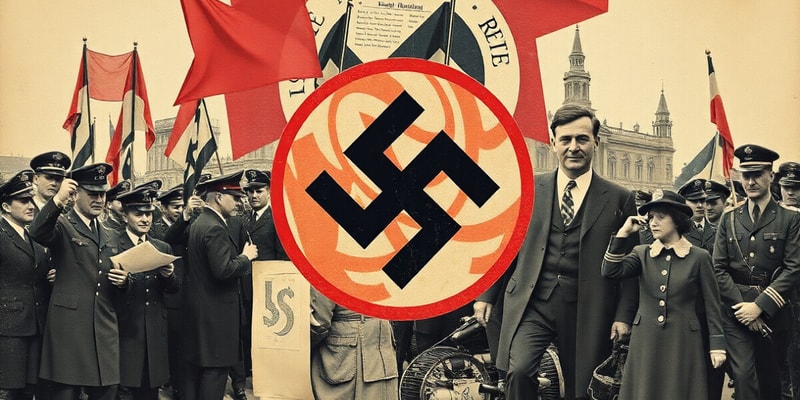Podcast
Questions and Answers
What event led to the emergence of the Weimar Republic?
What event led to the emergence of the Weimar Republic?
Who was the democratic leader that succeeded Kaiser Wilhelm II in 1918?
Who was the democratic leader that succeeded Kaiser Wilhelm II in 1918?
What exacerbated Germany's financial troubles after World War I?
What exacerbated Germany's financial troubles after World War I?
In what year did hyperinflation peak in Weimar Germany?
In what year did hyperinflation peak in Weimar Germany?
Signup and view all the answers
What constitutional changes were introduced by Friedrich Ebert and Philipp Scheidemann in the Weimar Republic?
What constitutional changes were introduced by Friedrich Ebert and Philipp Scheidemann in the Weimar Republic?
Signup and view all the answers
Which factor contributed significantly to the deepening divisions in Germany's postwar society?
Which factor contributed significantly to the deepening divisions in Germany's postwar society?
Signup and view all the answers
What enabled fringe movements like the far-right Nazi Party to grow in influence in Germany?
What enabled fringe movements like the far-right Nazi Party to grow in influence in Germany?
Signup and view all the answers
What combination of ideologies largely attracted followers to the Nazi Party in 1919?
What combination of ideologies largely attracted followers to the Nazi Party in 1919?
Signup and view all the answers
Which paramilitary volunteer forces flourished during the Weimar Republic era?
Which paramilitary volunteer forces flourished during the Weimar Republic era?
Signup and view all the answers
What event left President Ebert to rule temporarily by decree during the early Weimar Republic period?
What event left President Ebert to rule temporarily by decree during the early Weimar Republic period?
Signup and view all the answers
How did the Great Depression impact Germany in the early 1930s?
How did the Great Depression impact Germany in the early 1930s?
Signup and view all the answers
What event in January 1933 facilitated Hitler's consolidation of power?
What event in January 1933 facilitated Hitler's consolidation of power?
Signup and view all the answers
Study Notes
Nazism's Rise Amidst the Weimar Republic's Struggles
Between 1918 and 1933, Germany navigated through tumultuous times marked by profound political upheaval, social unrest, and economic instability—the era known as the Weimar Republic. It was within this context, rife with discontent, despair, and yearning for stability, that Adolf Hitler rose from relative obscurity to become one of history’s most infamous figures.
The Weimar Republic emerged following World War I, with its roots in the 1918 German Revolution. In November 1918, Kaiser Wilhelm II abdicated his throne, ushering in a new democratic government headed by Friedrich Ebert, who worked alongside Philipp Scheidemann to introduce constitutional changes and establish a parliamentary system. Despite initial optimism, numerous challenges beset the fragile democracy almost immediately.
Economic Woes
Weimar Germany faced devastating consequences after losing World War I, including punitive reparations imposed upon it by the Treaty of Versailles. These conditions exacerbated Germany's existing financial troubles, resulting in hyperinflation; between 1914 and early 1923, prices increased more than a millionfold. Ordinary citizens struggled under these harsh circumstances while some opportunistic business tycoons capitalized on their plight.
Social Division
Germany's postwar landscape also witnessed deepening divisions among classes and ethnic groups. Aside from economic disparities, deep-rooted tensions surfaced over issues such as unemployment and political representation. Communists and trade unionists advocated for working class interests; right-wing nationalist parties sought to bolster patriotic sentiments; Jews were subjected to rising anti-Semitic rhetoric, often perpetuated by populist politicians seeking to exploit emotions.
This fertile ground enabled fringe movements like the far-right Nazi Party (Nationalsozialistische Deutsche Arbeiter Partei) led by Hitler to grow in influence. Founded in Munich in 1919, the party began attracting followers due largely to its combination of ultra-nationalism, anti-Marxism, antisemitism, and radical right-wing ideology.
As the Weimar Republic grappled with mounting difficulties, public trust in established institutions eroded further. An attempted coup d'état in March 1920 failed miserably, leaving President Ebert to rule by decree temporarily. Alarmingly, radical groups like the Freikorps (paramilitary volunteer forces formed during the war) flourished amidst widespread lawlessness, threatening virtual anarchy.
By 1930, Germany had entered what is now referred to as the Great Depression. Unemployment soared to unprecedented levels, destabilizing the country still further. Meanwhile, the Nazi Party leveraged this chaos to cultivate popular support, forming alliances with other extremist factions and eventually achieving prominence within national politics.
In January 1933, President Paul von Hindenburg invited Hitler to form a coalition government. Having already garnered significant electoral successes, the charismatic leader took advantage of the opportunity to consolidate power around himself and set into motion events that would culminate in the establishment of Nazi totalitarian state.
Studying That Suits You
Use AI to generate personalized quizzes and flashcards to suit your learning preferences.
Description
Explore the historical context of Germany's Weimar Republic between 1918 and 1933 and the factors that led to the ascension of Adolf Hitler and the Nazi Party amidst economic hardships, social divisions, and political upheaval.




